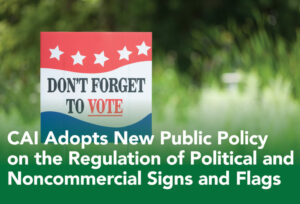BLOG
The Community Associations Institute, the leading organization representing the interests of community associations, recently brought some added clarity into the national conversation over restrictions of political and social-cause yard signs and flags in HOA communities. It issued a new public policy recommendation in October prior to the midterm elections to help its state legislative committees chart their work on this topic.
The organization’s new Political and Noncommercial Signs and Flags Public Policy reports that 13 states already have laws addressing signs. It notes that the First Amendment guarantees the right to freedom of speech without restriction by government entities or state actors, but it does not apply to private parties such as community associations.
 “CAI respects the right to freedom of speech set forth in the constitutions of the United States and various states but recognizes that right is not unlimited. CAI also recognizes and supports the rights of residential community associations to reasonably regulate political and noncommercial signs within communities in a manner consistent with federal, state, and local laws. CAI supports legislation that recognizes the core principles of self-governance, self-regulation, and co-ownership of common property and the community association housing model balanced with owners’ rights of free speech. Because each community is unique, legislation should allow an association to develop reasonable rules and regulations concerning the time, location, materials, size, number, and manner of where political and noncommercial signs, political displays, or political activities are located while preserving freedom of political expression,” reads the organization’s policy statement.
“CAI respects the right to freedom of speech set forth in the constitutions of the United States and various states but recognizes that right is not unlimited. CAI also recognizes and supports the rights of residential community associations to reasonably regulate political and noncommercial signs within communities in a manner consistent with federal, state, and local laws. CAI supports legislation that recognizes the core principles of self-governance, self-regulation, and co-ownership of common property and the community association housing model balanced with owners’ rights of free speech. Because each community is unique, legislation should allow an association to develop reasonable rules and regulations concerning the time, location, materials, size, number, and manner of where political and noncommercial signs, political displays, or political activities are located while preserving freedom of political expression,” reads the organization’s policy statement.
The new public policy brings an added measure of clarity on this issue for the organization’s chapters as well as its legislative committees working with state lawmakers across the country. It encourages state legislators to avoid outright bans on sign/flag policies and restrictions by HOAs, which should read the policy as a call to take on this issue if they have not done so already.
Doing so requires a fair amount of due diligence, which should include the input of highly qualified community association property management and legal counsel. After reviews of association governing documents and any corresponding state laws, their input should provide some helpful guidance and perspective on what can and cannot be done, and how different policy options tend to play out over time.
Once sign/flag policies are established, CAI reminds communities to distribute the new rules via email, and also to add them to the community website and display them within the community.
Political and social-cause yard signs in HOA communities tend to become an issue during every election season. As this new public policy from the associations industry’s leading voice indicates, every community should have the right to develop their own reasonable rules and restrictions to address such a pervasive issue. Their boards of directors would be wise not to shirk such a right, but rather to see it as a responsibility to develop and enact the approach to signs and flags that makes the most sense for their community.
Click here to read CAI’s complete statement on its new public policy recommendation.

